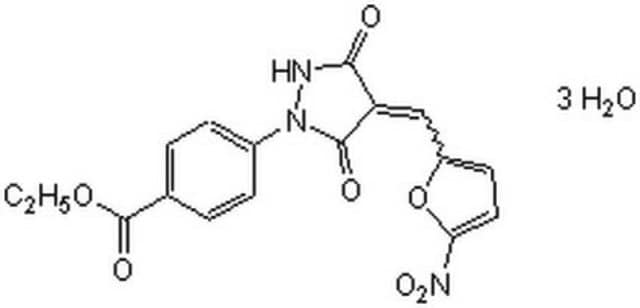N2915
PYR-41
≥98% (HPLC), powder
Synonyme(s) :
4[4-(5-Nitro-furan-2-ylmethylene)-3,5-dioxo-pyrazolidin-1-yl]-benzoic acid ethyl ester
About This Item
Produits recommandés
Niveau de qualité
Pureté
≥98% (HPLC)
Forme
powder
Couleur
red to brown
Solubilité
DMSO: 5 mg/mL, clear (warmed)
Température de stockage
−20°C
Chaîne SMILES
CCOC(=O)c1ccc(cc1)N2NC(=O)\C(=C/c3ccc(o3)[N+]([O-])=O)C2=O
InChI
1S/C17H13N3O7/c1-2-26-17(23)10-3-5-11(6-4-10)19-16(22)13(15(21)18-19)9-12-7-8-14(27-12)20(24)25/h3-9H,2H2,1H3,(H,18,21)/b13-9+
Clé InChI
ARGIPZKQJGFSGQ-UKTHLTGXSA-N
Application
- to determine the cellular degradation pathways on adeno-associated viruses (AAV) transduction
- to assess its selectivity and potency by matrix assisted laser desorption/ionization-time of flight (MALDI-TOF) E2/E3 assay
- to treat fully differentiated C2C12 myotubes in high glucose medium for determining its effect on protein ubiquitination and cell viability
- in the pretreatment of human brain microvascular endothelial cells (hBMECs) for the inhibition studies before infection with bacteria
Actions biochimiques/physiologiques
Mention d'avertissement
Warning
Mentions de danger
Conseils de prudence
Classification des risques
Acute Tox. 4 Oral - Skin Sens. 1
Code de la classe de stockage
11 - Combustible Solids
Classe de danger pour l'eau (WGK)
WGK 3
Point d'éclair (°F)
Not applicable
Point d'éclair (°C)
Not applicable
Certificats d'analyse (COA)
Recherchez un Certificats d'analyse (COA) en saisissant le numéro de lot du produit. Les numéros de lot figurent sur l'étiquette du produit après les mots "Lot" ou "Batch".
Déjà en possession de ce produit ?
Retrouvez la documentation relative aux produits que vous avez récemment achetés dans la Bibliothèque de documents.
Les clients ont également consulté
Notre équipe de scientifiques dispose d'une expérience dans tous les secteurs de la recherche, notamment en sciences de la vie, science des matériaux, synthèse chimique, chromatographie, analyse et dans de nombreux autres domaines..
Contacter notre Service technique







